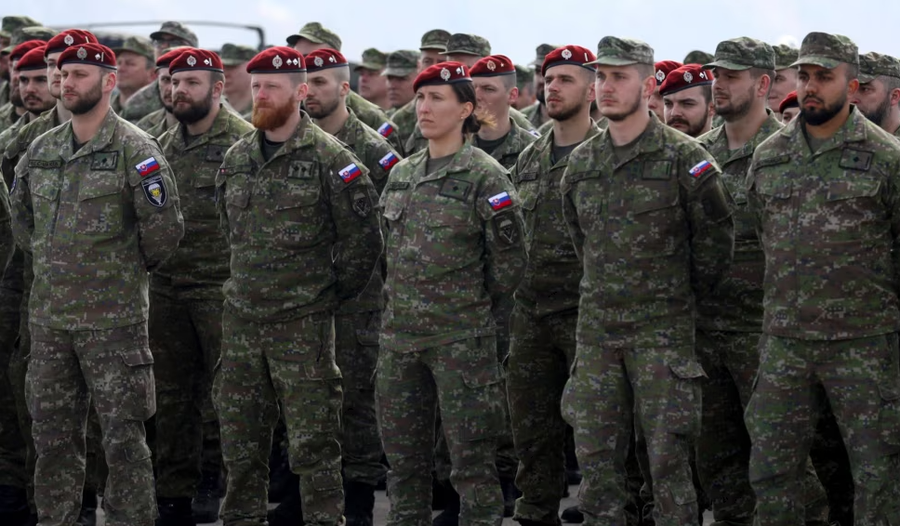
The inauguration of the new US president, Donald Trump, could mark the beginning of a new Washington policy towards Ukraine, with pledges of commitment to a peace agreement or ceasefire and a clearly expressed desire for US withdrawal.
This has prompted European leaders to discuss previously unimaginable options for ensuring Ukraine's security after the war, without US involvement.
At the top of the list is French President Emmanuel Macron's suggestion to deploy European military forces in Ukraine, if a deal is reached.
This proposal, first put forward nearly a year ago, received new impetus after Trump's victory in the US presidential election. Last month, Italian Defense Minister Guido Crosetto said Rome would be willing to join such a mission, while his German counterpart, Boris Pistorius, said Berlin was "preparing" and "considering scenarios."
But these two examples highlight the major obstacles to achieving such a mission.
Italian Foreign Minister Antonio Tajani said such discussions are premature.
Given the occupation of the Soviet Union — including Ukraine — by Nazi Germany during World War II, it is also difficult to imagine German forces being deployed in Ukraine.
The European Union's foreign affairs chief, Kaja Kallas, said that as long as Russia is bombing Ukraine, "we have nothing to discuss."
Of course, she meant “we have nothing to discuss publicly.” But her comment highlights another factor that could make a European military role impossible: Russian President Vladimir Putin.
“I think there is absolutely no indication that Putin is interested in negotiations at this point,” said Ian Bond, deputy director of the Center for European Reform. “You know, Putin thinks he’s winning.”
Difficult task
Bond is not alone in this assessment.
But Trump seems to disagree, having declared at a Jan. 7 press conference at Mar-a-Lago that he believed he could reach a deal within six months. But, still, there is no sign that Putin would accept a European force.
Nicu Popescu, from the European Council on Foreign Relations, sees another difficulty. As a permanent member of the UN Security Council, Moscow could block any peacekeeping mission.
"The problem with traditional peacekeeping missions is that they depend on UN decisions, which means that Russia can veto or end the mission at any moment. Such a mission would not be limited to Western countries, but would also include troops from other parts of the world," he said.
Popescu, who was Moldova's Foreign Minister in 2021-2024, said that European leaders are not discussing peacekeeping troops.
"What is being discussed is a military presence to prevent another war. That means troops, not lightly armed peacekeeping forces, but troops equipped with anti-aircraft capabilities, for cybersecurity, to protect cities like Odessa and Kiev," he said.
Popescu admits that this is a "difficult task" for European armies.
Britain and France have the most powerful armies in Europe, but they are overstretched.
In Britain, the military has been largely focused on counter-terrorism and counter-insurgency operations since the September 11, 2001 attacks on the US. It has undergone cuts in resources over the past decade and a recent parliamentary report said Britain was “unprepared” to deal with the Russian threat.
In July, Prime Minister Keir Starmer announced that the defence strategy would be reviewed, stating that Britain's armed forces were "weakened".
The French military has more personnel than the British, but is also overstretched by long combat deployments in Africa. French experts have expressed doubts about the French military's ability to handle a more intense conflict, such as the one in Ukraine.
“We only have six long-range missile launchers, we have no real means to combat drones,” Leo Peria Peigne, of the French Institute for International Relations, noted in November.
Ukrainian President Volodymyr Zelensky has said that security guarantees for Kiev to end Russia's war would be effective only if provided by the United States. Some supporters of the idea of a European military presence say this would only be possible with U.S. assistance in areas such as planning, logistics and intelligence.
Political restrictions
Alongside these military constraints are political ones. Would European governments really be willing to send significant forces to Ukraine, against Russia's wishes and without US involvement on the ground?
The idea could be very unpopular with European citizens. Polls in Western Europe have consistently shown low levels of support for the idea of sending troops to Ukraine.
The risks of sending such a force, even in a non-combat role, would be great. Rules of engagement would need to be established, including guidelines on how members of the force should respond if fired upon by Russian forces, and the political consequences if there are casualties could be significant.
Macron is already facing a difficult time after losing his majority in France's National Assembly. Starmer has just returned the Labour Party to power after 14 years in opposition. Both leaders have a lot to lose from a bloody crisis involving their soldiers in Ukraine.
The risk of escalation also plays a significant role. This seems to be one of the reasons why the administration of outgoing US President Joe Biden ruled out any military presence in Ukraine.
However, some analysts argue that the situation on the battlefield could deteriorate so much that European leaders will feel compelled to act.
"If you're Poland, the prospect of Ukraine collapsing with millions of refugees crossing your borders and Russian forces closing in on your border is much, much worse than the prospect of doing more to support Ukraine's current front lines," said Ian Bond.
But, he added, "we are very, very far from this."/ REL (A2 Televizion)











